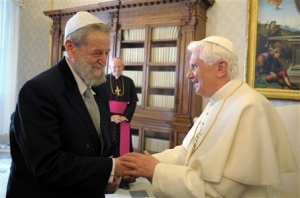Pope Benedict VXI has been slammed by Israeli critics for perceived omissions in his speech at Yad Vashem, the Holocaust memorial in Israel. Ha’aretz said the pope displayed “verbal indifference and banality.”
The pontiff failed to acknowledge the role of Christian anti-Semitism in the Holocaust, his past as a Hitler Youth, and his rehabilitation of a Holocaust-denying bishop in January, according to Jewish critics.
National Catholic Reporter’s John Allen says that Benedict has addressed all these things before, and that the pope might have been thinking bigger at Yad Vashem.
“Benedict XVI seems to see such settings – not just Holocaust memorials, but also, for example, the site of the 9/11 terrorist attacks in New York, which he visited last April – as eternal reminders of the seductive power of hatred. One has the impression that to him, it would fail to do justice to what these places represent if he were to turn the focus upon himself, or recent events and plans of action, or even too much on the historical particularities of the location.
In a sound-bite, he seems to believe that occasions for grappling with the deepest and most painful mysteries about God’s plan require something more from a pope than good image management.”
What I can’t figure out is why people are still surprised that a German theologian in love with abstraction has become a pope that occasionally misses the trees for the forest.





